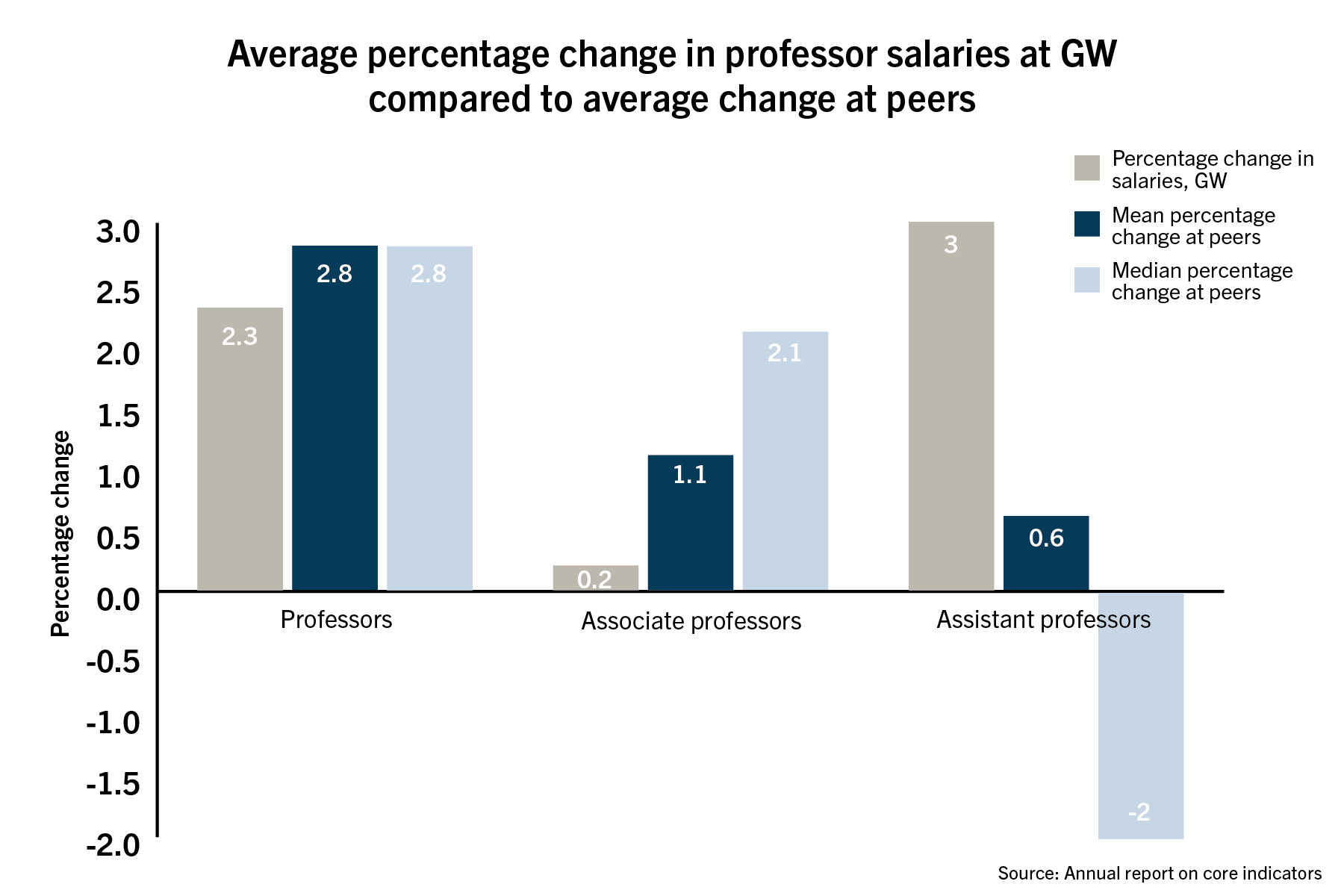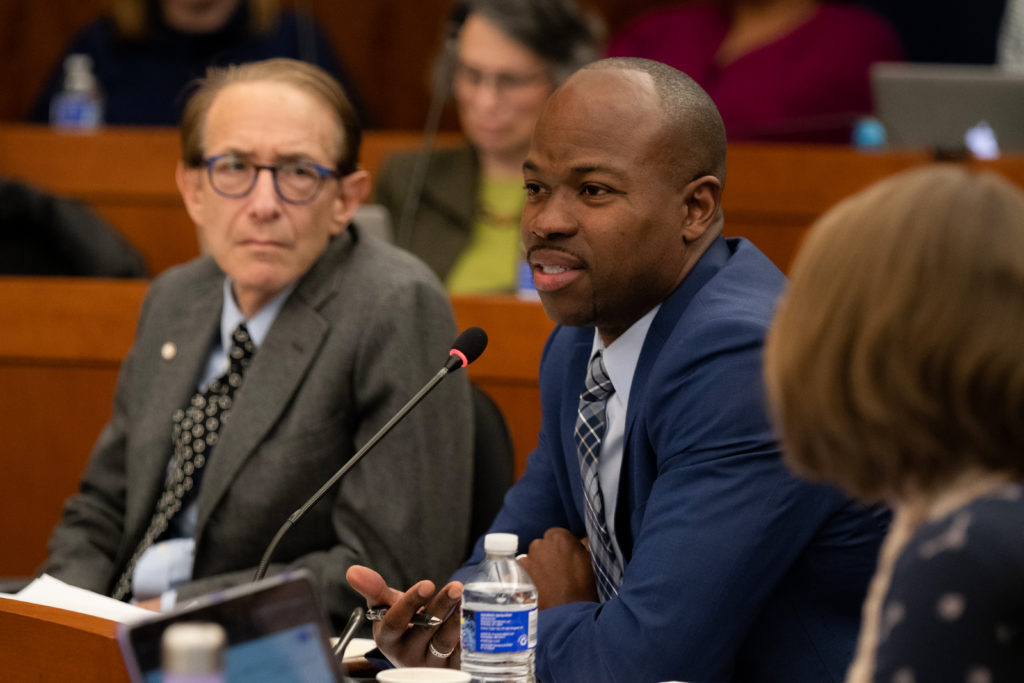Officials said the University’s rankings for faculty salaries have been improving over the past several years compared to GW’s peer schools.
Provost Brian Blake said at a Faculty Senate meeting earlier this month that professors’ salaries increased by 2.3 percent, slightly below the 2.8 percent median increase for GW’s peer schools, from the 2018-19 to 2019-20 academic years. The Office of Faculty Affairs and the Office of Institutional Research and Planning said in a joint statement that average salaries for associate professors have maintained a fourth-place ranking compared to GW’s peer schools, which they said has been the University’s “best ranking over the years.”

Sidney Lee | Graphics Editor
The rankings for full professors’ salaries increased from sixth place to fifth, indicating that GW is “making progress” compared to its 12 peer schools, officials said. The overall changes could be the result of fluctuations in the faculty composition as different professors “move between cohorts,” according to the statement.
“It is important to remember that the average salaries in each cohort are not comparing the same people year over year,” officials said in an email. “Faculty move up in rank, leave and there are new hires whose salaries differ by discipline. That said, there is a general upward trend across all ranks over the long term.”
The average salary for associate professors increased by 0.2 percent compared to the mean and median percent increase for peer schools, which are 1.1 percent and 2.1 percent, respectively. The average salary for assistant professors increased by 3 percent, which was higher than the mean and median variations for the peer schools, with a 0.6 percent increase and a 2 percent decrease, respectively.
Officials said GW’s improved standing with assistant professors’ salaries was the result of overall “declines” experienced by the market basket schools.
“For example, Northeastern’s mean salary reportedly went down 15 percent and Georgetown went down 2 percent,” officials said. “This likely reduced the mean scores. Thus, by comparison, GW went up. Similarly, if you look at GW’s change in rank for associate and full professors, our ranking compared to our peers either went up or stayed the same.”
Officials declined to say if there is an average amount that salaries for full, associate and assistant professors usually increase from year to year.
Administrators implemented a freeze on faculty merit salary increases last year to mitigate the financial impact of the COVID-19 pandemic. But officials said the changes are not a result of the freeze because the freeze was implemented after the academic year ended.
Members of the senate’s committee on appointment, salary and promotion policies said the rankings are an upward trend for the University even though they continue to remain below the averages for GW’s market basket schools.
Joseph Cordes, a professor of economics and a member of the senate’s ASPP committee, said the gap between GW’s salary increase and that for its peer schools could be the result of slight changes in salaries for a single year if any school happened to hire several well-paid professors.
He said officials hope to increase faculty members’ salaries to the top quintile of the American Association of University Professors’ report, but their efforts have been stalled by the freeze on merit salary increases during the pandemic. Officials have proposed unfreezing the merit increases by July and will begin to hire new staff then, he said.
University President Thomas LeBlanc said at the senate meeting this month that officials plan to restore merit salary increases and matching retirement contributions this July.
Cordes said he is waiting to see the AAUP report for this academic year to have a better idea of why GW had a smaller salary increase percentage relative to other universities in the 2019-20 academic year. He said the committee will “look at” the issue at its next meeting.
“I am eagerly awaiting to see what the AAUP data tells us in April and May, because that’ll give us a better idea,” Cordes said. “And again, I would say, given what we say we want to be and are, if it tells us that we are not competitive, then we need to change that.”
Murli Gupta, the chair of the ASPP committee, said GW has been doing “very well” in rankings compared to the other market basket schools but still has the chance to continue improving its position.
“In fact, it seems pretty high compared to the averages of the other market basket schools,” he said. “But notice that our ranking is seven from a group of 13 [for assistant professors’ average salaries] so we are smack dab in the middle.”
He said because GW doesn’t receive large government subsidies like state schools do and donations can’t be used for faculty salaries, GW’s “incoming budget” prevents salaries from increasing as much. Gupta said faculty salaries should ideally increase by 10 percent every year, but “that’s not practical.”
The University of Pittsburgh, GW’s only peer school that’s a public university, saw a 3.7 percent average salary increase for its full-time professors in the 2019-20 academic year, more than 1 percent higher than GW’s.
Gupta said faculty members don’t get any automatic salary increases other than merit raises, and “most professors” don’t expect large merit salary increases every year.
“Every year, the faculty members are evaluated for the work that they have done in the year – the research, teaching, advising and other duties,” he said. “They are evaluated by the department chairs and deans and then provost – that’s when the decisions are made.”







